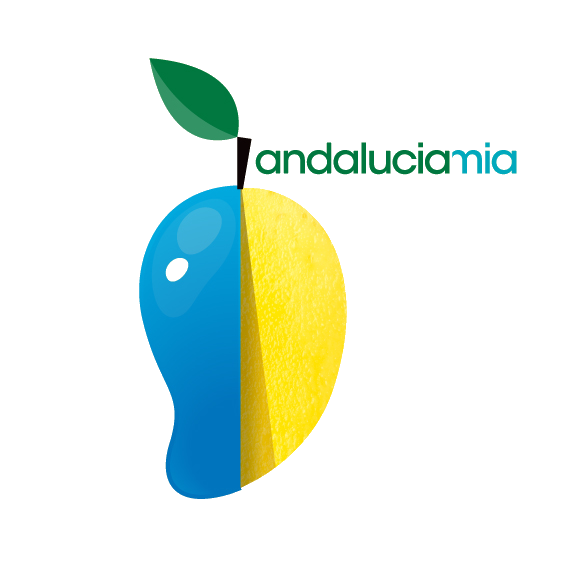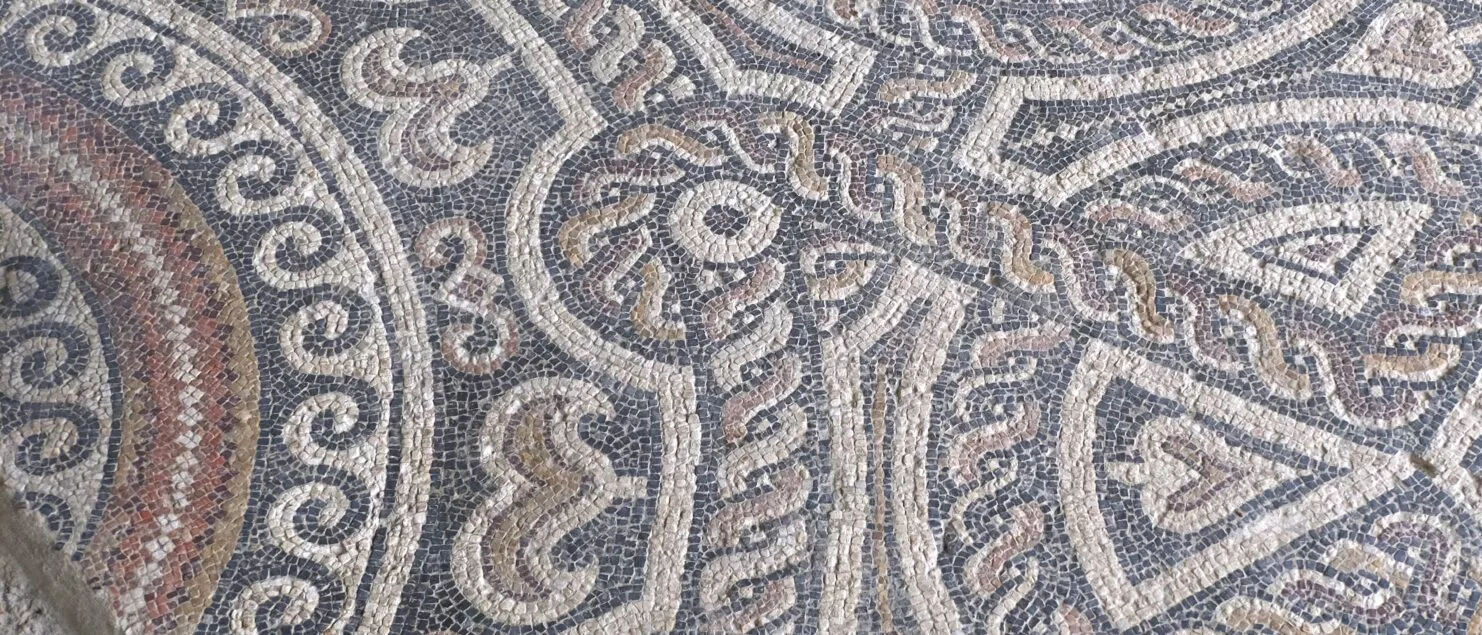Archaeological site in Andalucia – the incredible villa of Salar
Visit the archaeological site of Salar in Andalucia
In this article you’ll find all the information you need about this incredible archaeological site in Andalucia, the Villa Romana de Salar:
- A few words about Salar
- Where is Salar in Andalucia?
- The origins of this incredible archaeological site
- Visit to the archaeological site of Salar
- The curious activities of ancient Rome in Salar
- The main annual festivities in Salar
- What visits and activities can you do in Andalucia around this archaeological site?
- Book accommodation in the area
- Some useful links
- The latest articles on authentic Andalucia
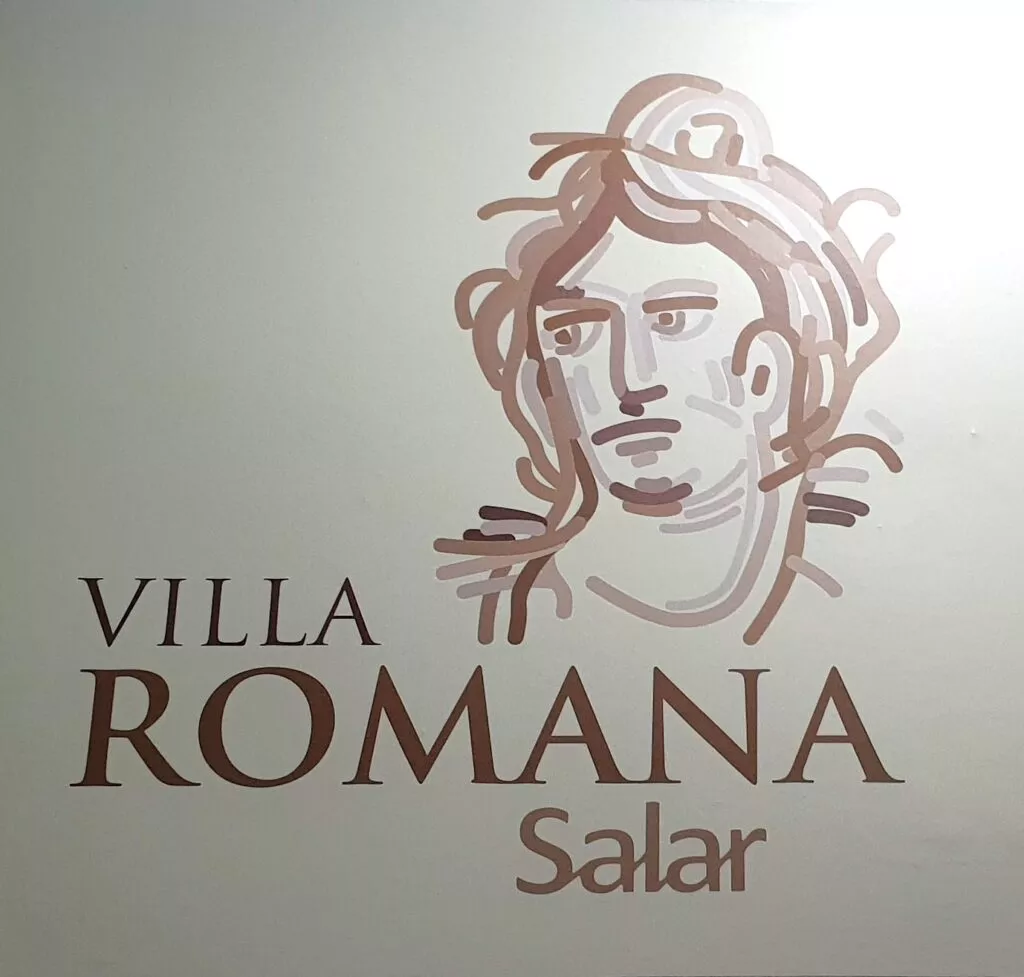
A few words about Salar
Salar is a small town in the province of Granada in the Poniente Granadino region. Granada city is about 50 km away and Loja a few kilometres.
The origin of the name Salar is still uncertain. It is thought to have originated from the salt mines in the region. The most likely hypothesis today is the Arabic origin of the name, al sal, meaning house, dwelling.
In 2018, just a few years ago, excavations unearthed one of the most spectacular Roman remains in modern-day Spain. Salar has been in the news ever since.
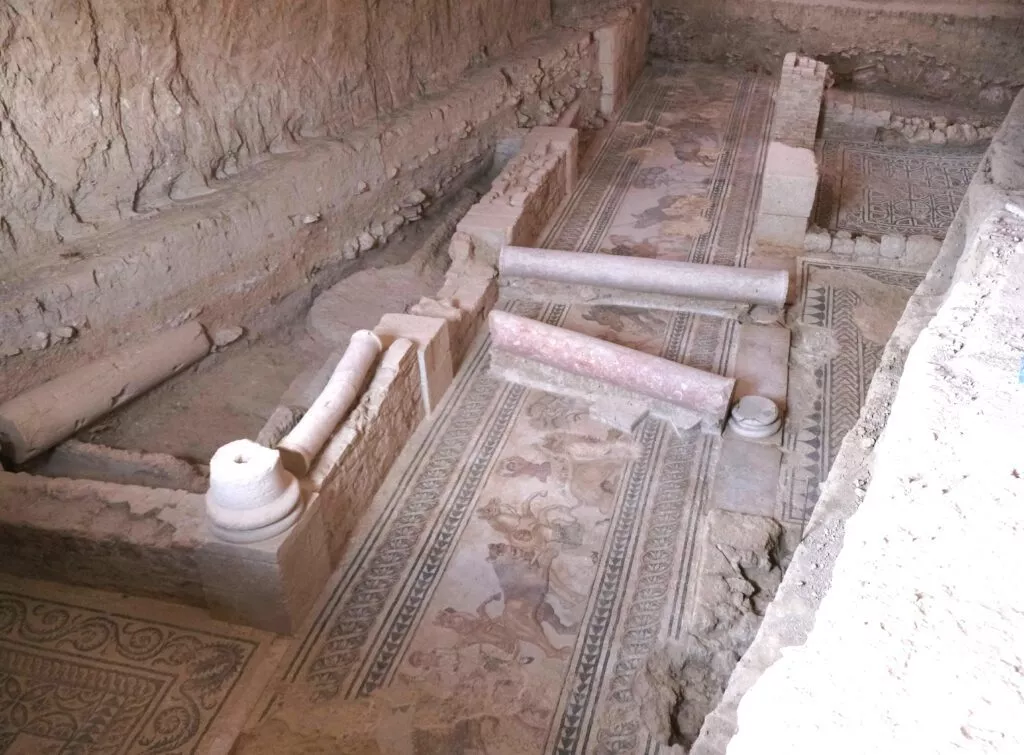
It has to be said that one of the features of this Roman villa is the ostentatious decoration found in the mosaics. It is quite simply magnificent and worthy of a work of art.
The recent and unlikely discovery of this archaeological site in Andalucia
The improbable discovery: in 2004, it was decided to build a wastewater treatment plant for this small town. After some work in the ground…. was discovered what is now considered to be one of the most interesting Roman buildings preserved in Spain.
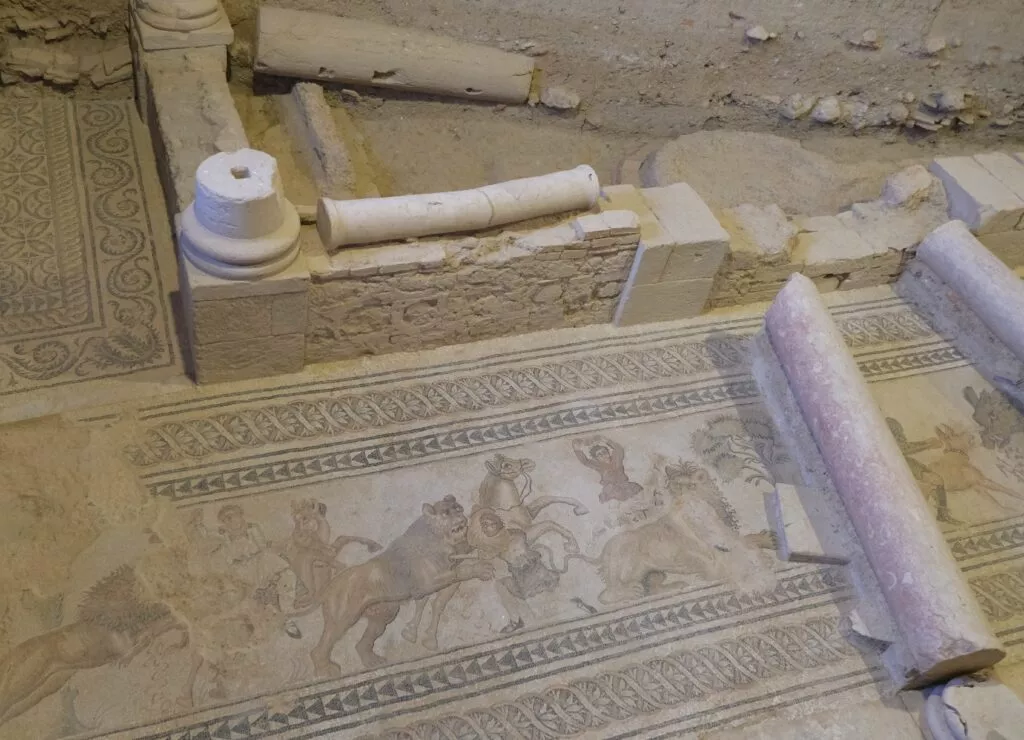
Archaeological work began in 2006. So far, 4 excavation campaigns have been carried out, and even today, only 10% of the remains are visible! And yet we can already see a lot – in my personal opinion.
The Villa Romana at Salar is exceptional. According to the site’s chief archaeologist, Julio Román – you can’t make this stuff up 🙂 – its owner, the dominus, called on the services of first-rate architects, probably from North Africa. At the time, these architects were at the cutting edge of the latest construction and ornamentation methods available.
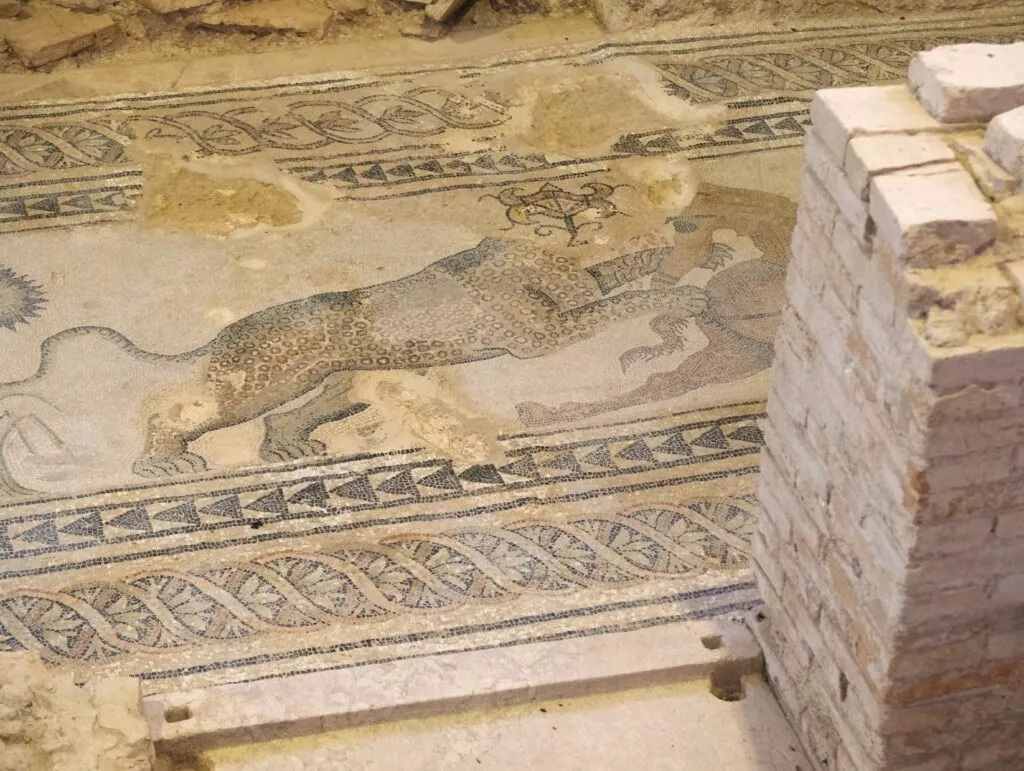
As the excavation work progressed, Julio Román was able to reveal the true extent of the site, confirming the importance of this area of the province of Baetica and the Villa de Salar from the time of the High Roman Empire, at the beginning of our era.
The Roman period at this archaeological site in Andalucia
The man who lived there at the height of his splendour, at the beginning of our era, wanted to make a clear statement about his status as an aristocrat, and to this end built a Villa de Peristilo, a seigneurial residence of an agricultural nature.
The residence is located in an area that has suffered numerous floods, which no doubt explains why it was abandoned a few centuries later, and also the quantities of silt under which the site lies.
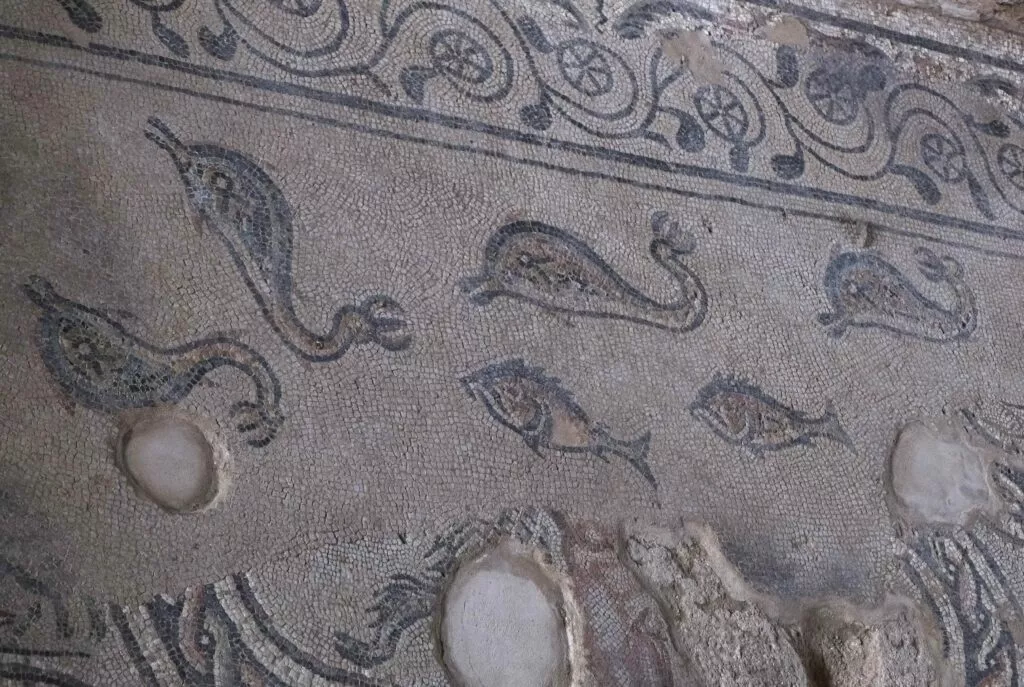
The splendid mosaics, dating from the 4th century, which served to demonstrate the status of aristocrats in this villa in the middle of the countryside, have an explanation. In fact, in the 4th century, many Roman aristocrats felt suffocated by the enormous tax burdens (the first tax exiles of our era 🙂 ) that weighed on them in the cities,’ explains Julio Román, archaeologist at the University of Granada.
Leaving the city meant moving to the countryside. There, these potentates, accustomed to the pomp and comfort of their status, had spectacular villas built with a dual aim: to live as well as possible and to impress their visitors.
Where is Salar and this archaeological site in Andalucia?
Visit to the archaeological site of Salar, province of Granada, Andalucia
A villa romana de Salar is an agricultural and livestock farm dating from the Roman era. The Salar villa has been dated to between the 1st and 5th centuries AD. Here are some photos of the few places open to visitors. The excavations are still going on… so it will be interesting to come back periodically!
The Triclinium – the dining room
The Triclinium is the Villa’s main dining room and one of its most important rooms. It was here that the great banquets of the period were held. The triclinium occupied a prominent place among the owner’s living quarters. Luxury had gone so far as to bring in water and create a waterfall inside.
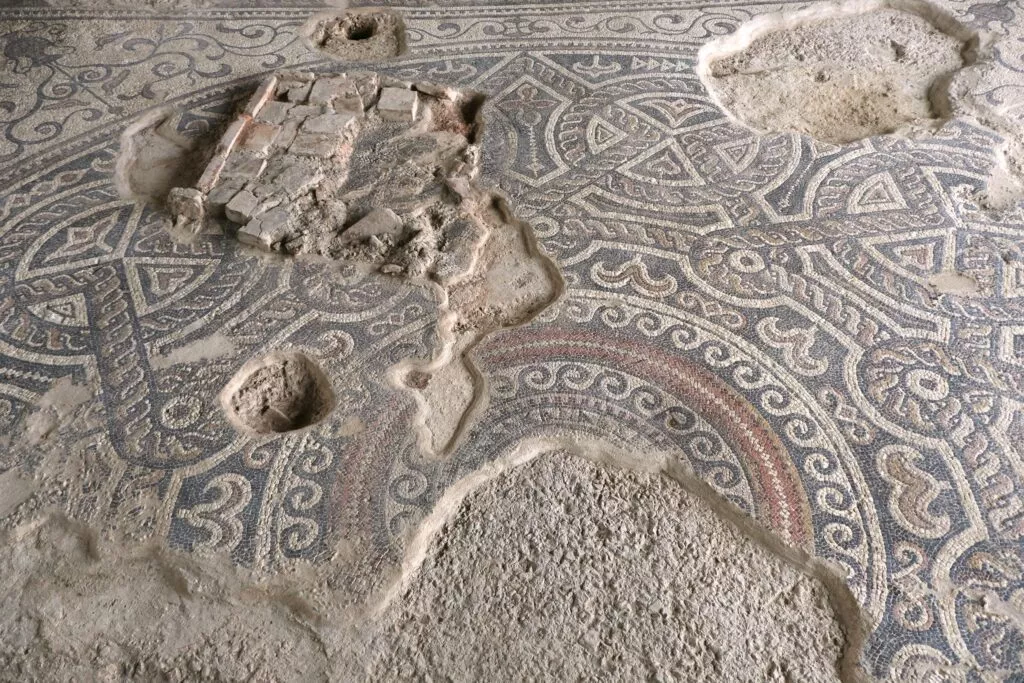
The room is paved with a polychrome mosaic featuring plant and geometric motifs. The wall plinths were covered with marble slabs and opus sectile compositions.
The vaulted room
The function of this room is still unknown today. All that is known is that it belonged to a building adjoining the south corridor of the dominus’ residence, on the south side.
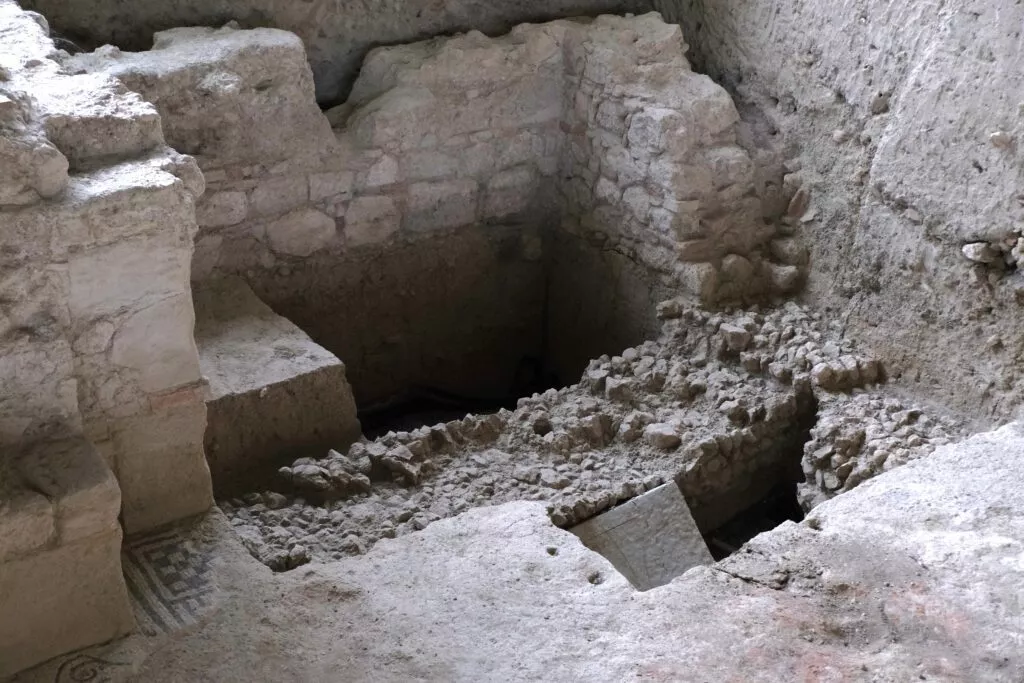
It had a mosaic floor with geometric motifs (although this has almost completely disappeared) and a spectacular vaulted ceiling. We know this from the parts of the roof that have been found:
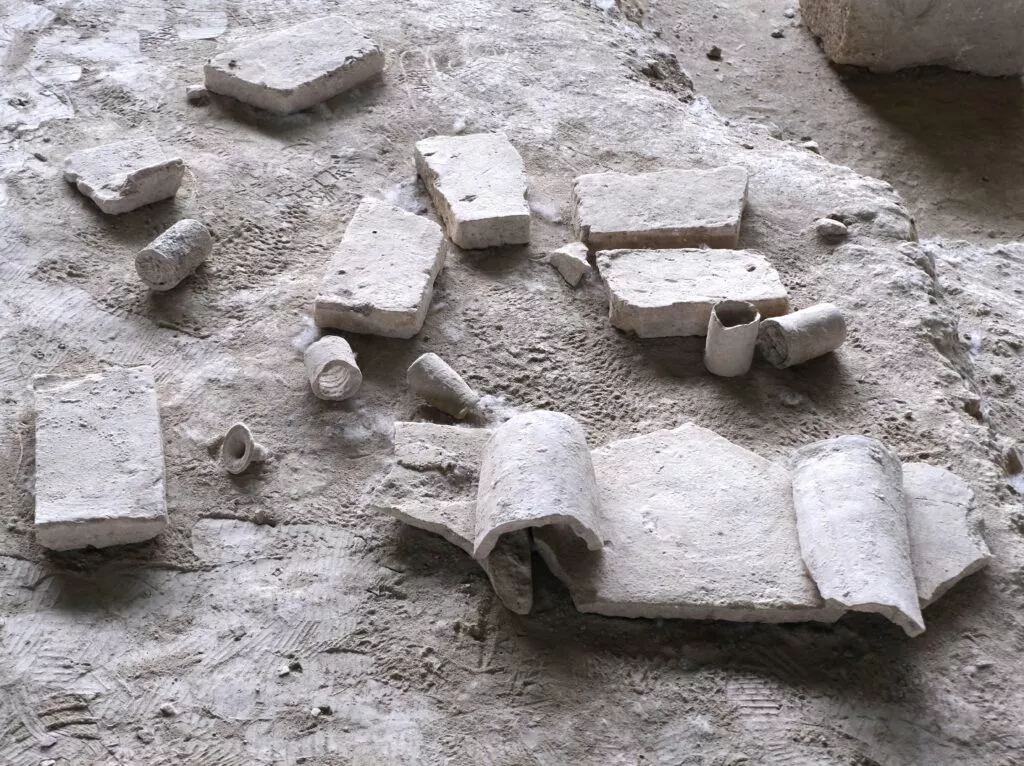
The roof structure was made up of rows of tubi fittili, which is very rare in the Iberian Peninsula.
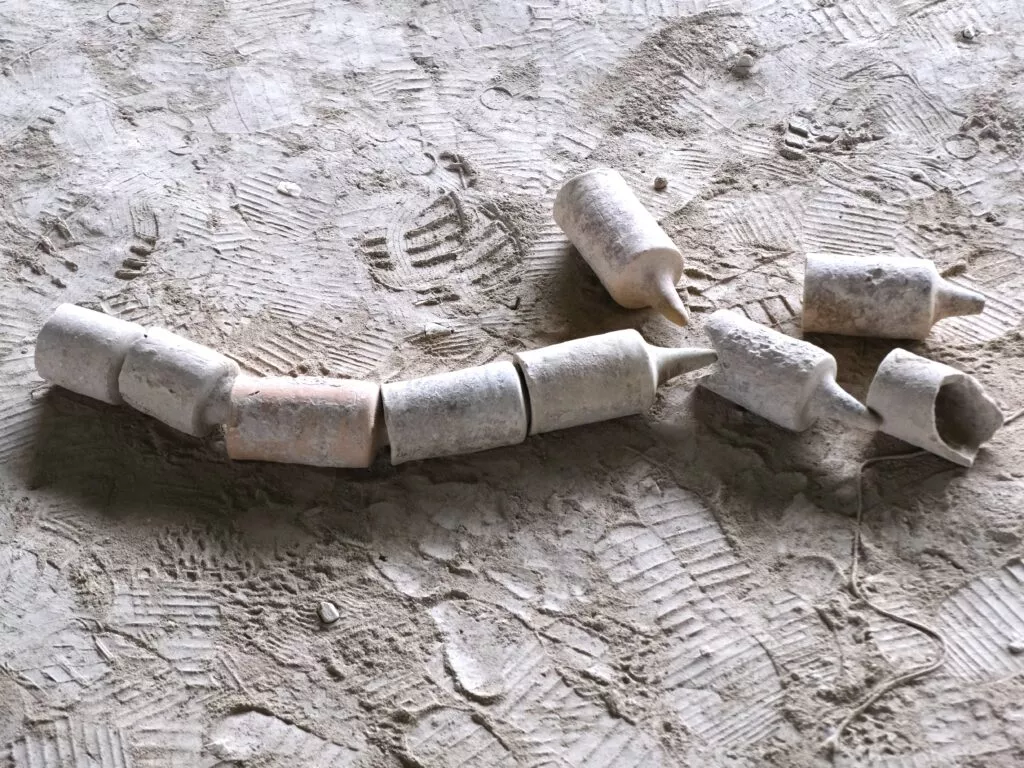
These tubi fittili made it possible to build vaulted roofs.
The eastern corridor of the Peristyle
The floor features a beautiful mosaic.
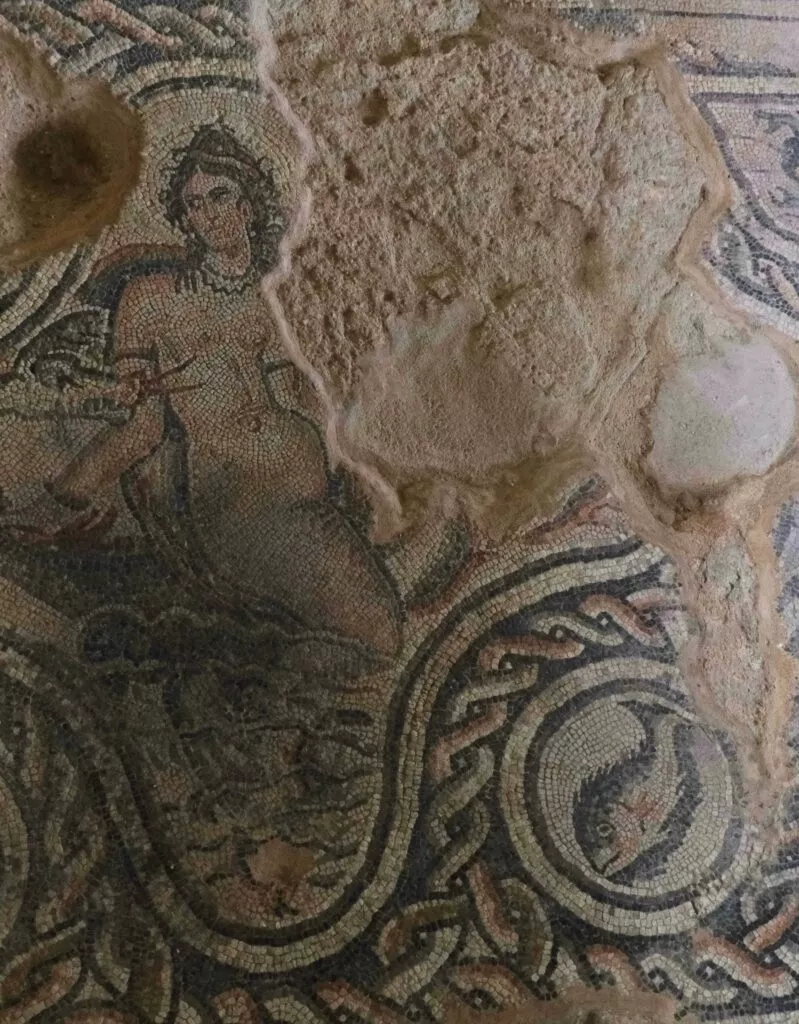
It depicts a goddess from Roman mythology, Salacia (Amphitrite in Greek), who was the wife of Neptune (Poseidon in Greek). The marine motifs remind us that she was the divinity of salt water, and therefore of the sea.
The mosaics depict a mythological scene: the legend of Amphitrite, who refuses Poseidon out of modesty. She decides to hide in the depths of the sea, but dolphins come to get her and present her to Neptune, who marries her.
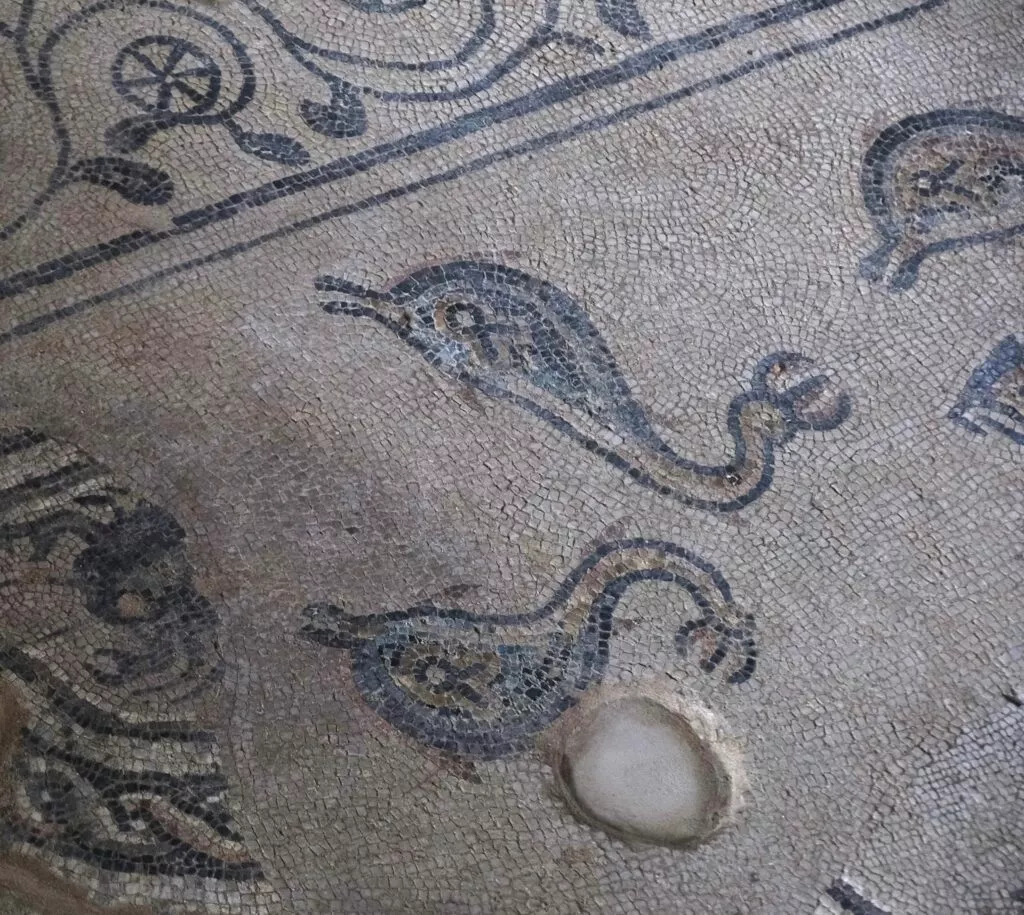
The very small mosaic pieces show the incredible craftsmanship and a certain opulence of the master.
West corridor of the villa
The west corridor of the villa features an incredible hunting scene in mosaics, in which lions, wild boars and leopards are defeated – as could not be otherwise – by the owner of the house 🙂 !
Excavation of this western corridor of the peristyle began in 2017 and has brought to light this exceptional polychrome mosaic.
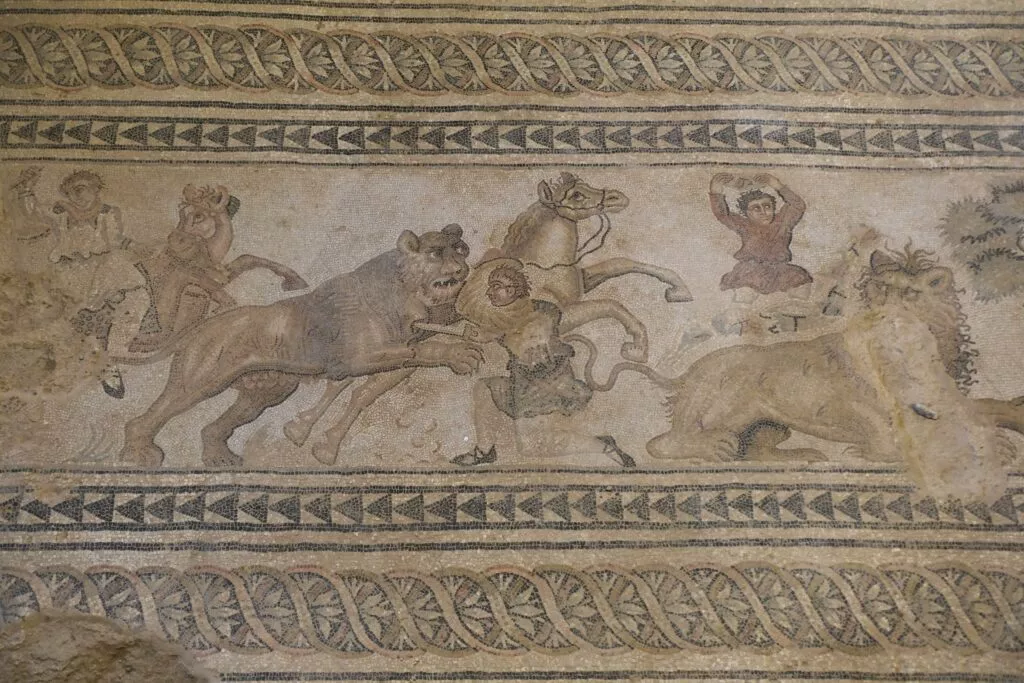
This space is very well preserved in its structures and decorative elements (walls, mosaics, stone thresholds, columns). Three rooms open onto this colonnaded space, all paved with elegant geometric mosaics.
I was dazzled by this room and the quality of the mosaics. In the photos, you can barely make out the mosaic pieces – you’d think it was a painting!
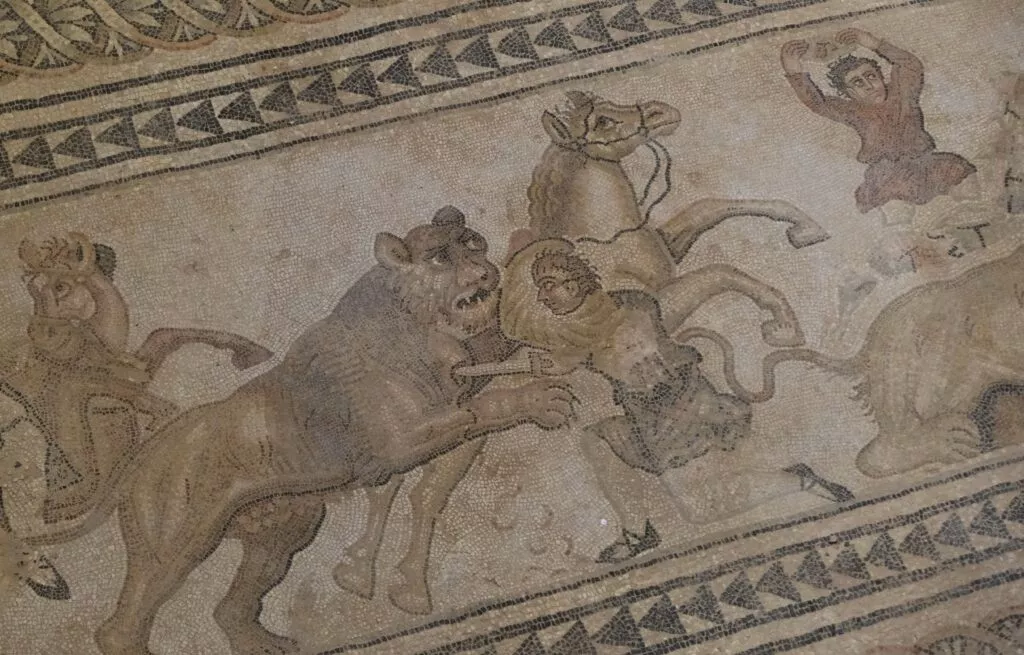
The decorations that adorn the rooms dedicated to the residence of the dominus of this Roman villa in Salar reveal the economic power and pre-eminent social position of its inhabitants.
This hunting scene shows off the dominus with all possible majesty, in the style of Hellenistic and Macedonian scenes. Alongside this magnificent entrance corridor, there are also a number of rooms that archaeologists and time will come to understand.
The two columns on the floor offer the only current clue to the name of this Roman potentate: LVP. Three sculpted letters at the base of two columns correspond to the tria nomina (proper name, family name and genealogical name), as the aristocrats were known.
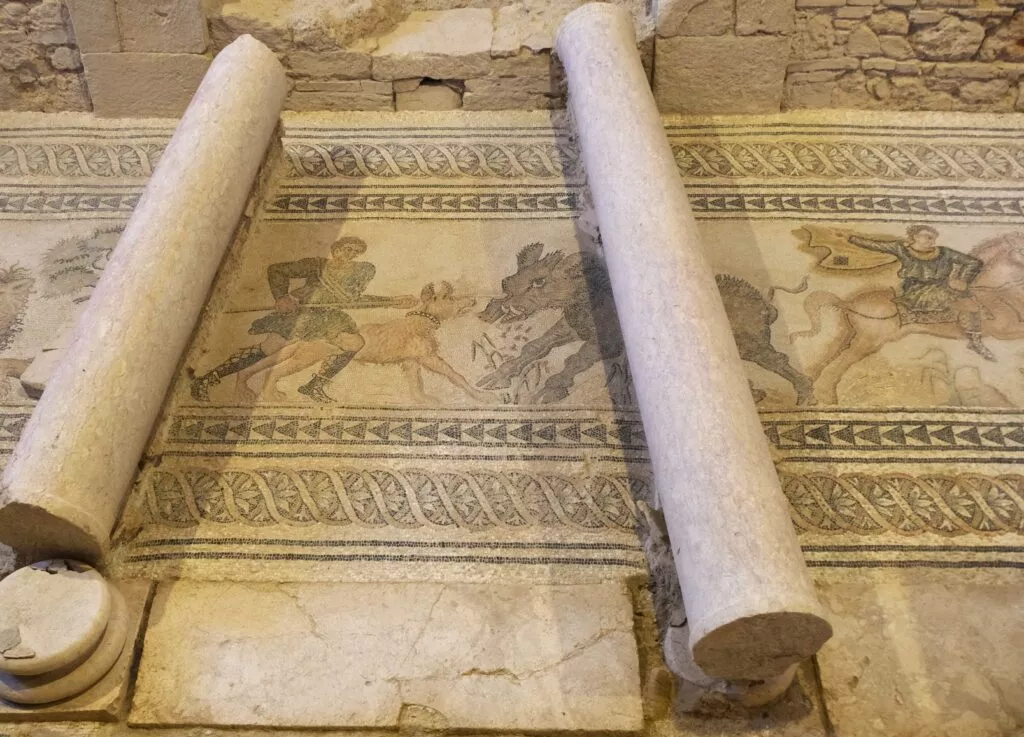
They also show the height of the domus and the roof of the house.
The room at the end of the corridor
This is presumably a cubiculum (dormitory), quadrangular in shape, which opens onto the western corridor surrounding the peristyle. It features a beautiful, well-preserved polychrome geometric mosaic.
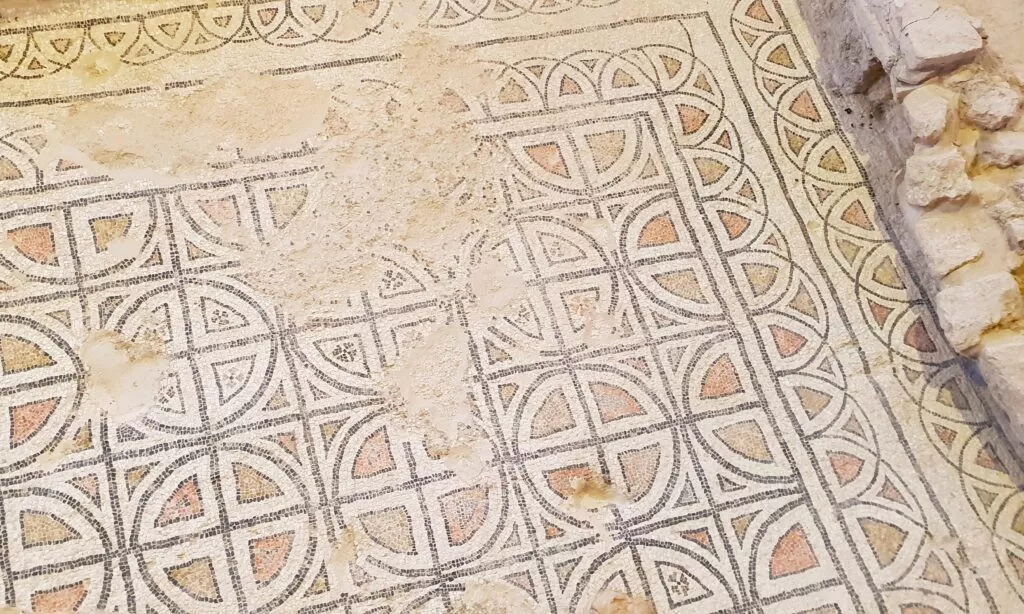
I personally found the motifs magnificent.
Excavations at another Roman villa
Excavations are also currently underway at another Roman villa, some 50 or 60 metres from this one. And although it is a more recent villa, dating from the 6th or 7th century, there is none of the luxury to be found in the previous one:
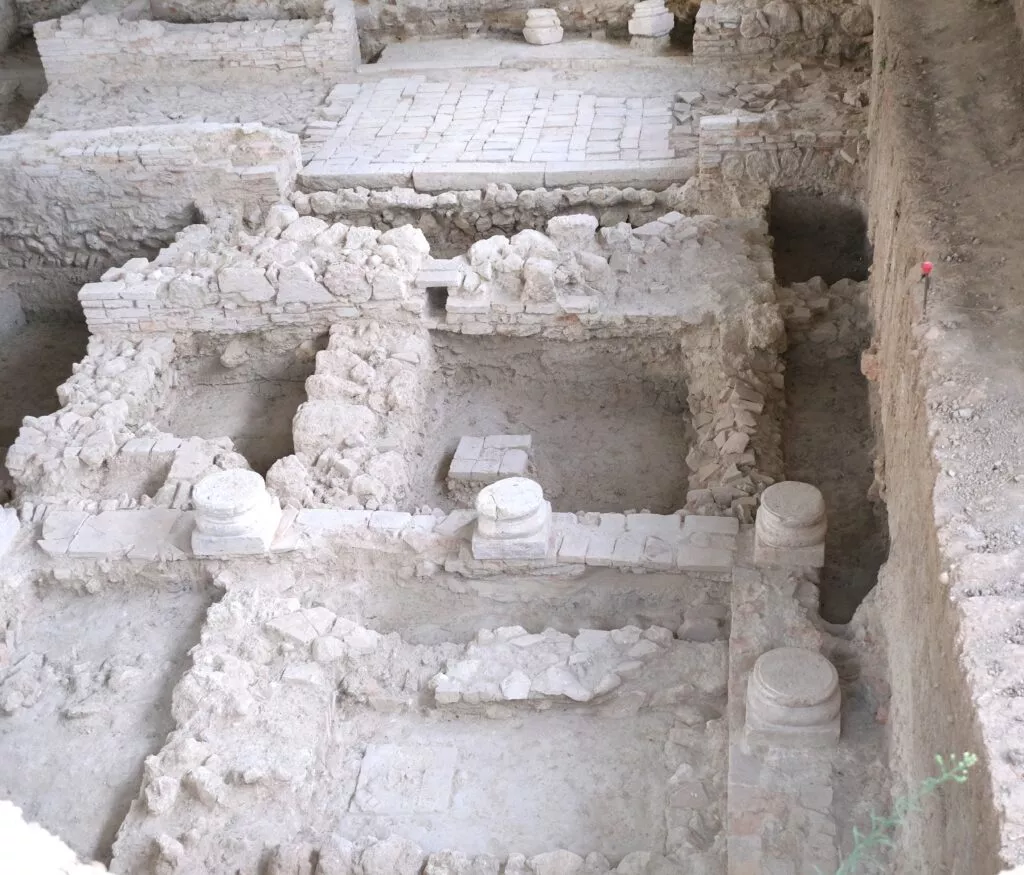
The Salar tourist office – the Roman villa interpretation centre
The tour ends in the interpretation centre, which houses some of the remains found during the excavations. There is also a short film on this period of history, which provides a more detailed understanding of the entire site.
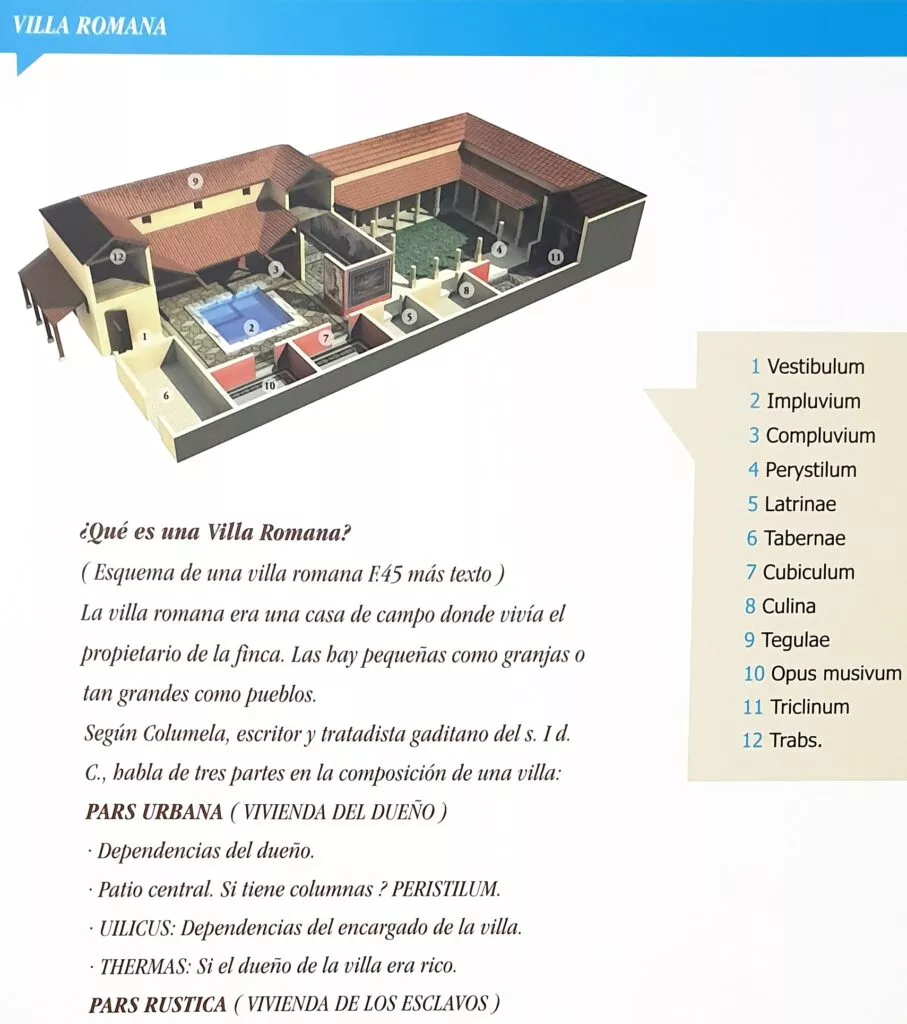
The highlight at the tourist office is, of course, seeing the three marble sculptures found on the site: Venus Pudicola Capitolina, Nymph Pudicola and Nymph Venera.
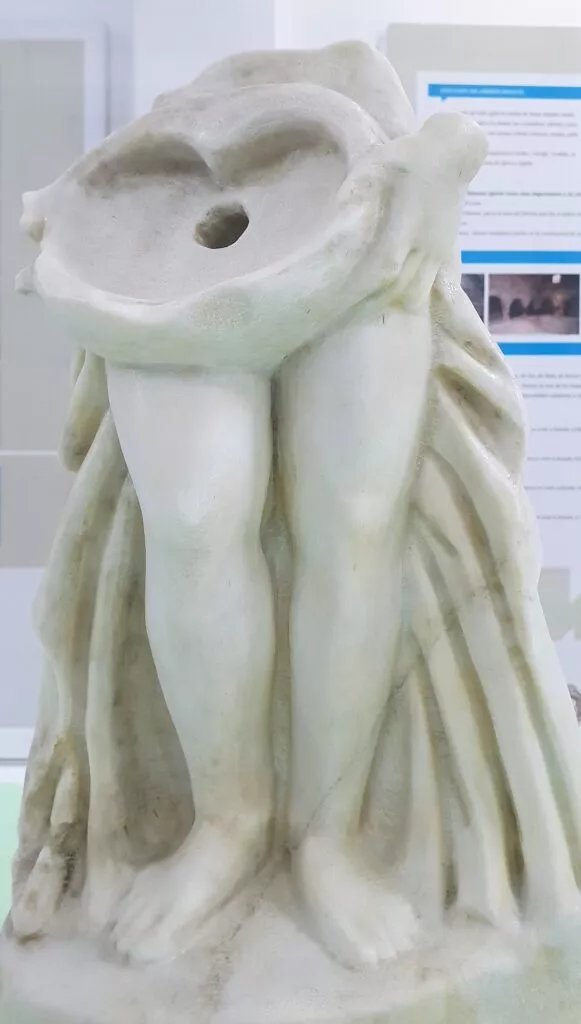
To book a guided tour of the archaeological site
Visit the Town Hall website. You can register online here.
6 curious Roman activities to discover in Salar
These activities are part of the Beatus ille experience. Contact the Town Hall to find out when these experiences can be booked.
NB: Beatus ille is a Latin phrase that can be translated as : Happy is he who….
1 – Oil lamps workshop
Participants in this workshop will make their own Roman lamp or a tic-tac-toe game.
2 – Archaeological digs workshop
Each participant will be able to go on a dig and discover different remains from the past.
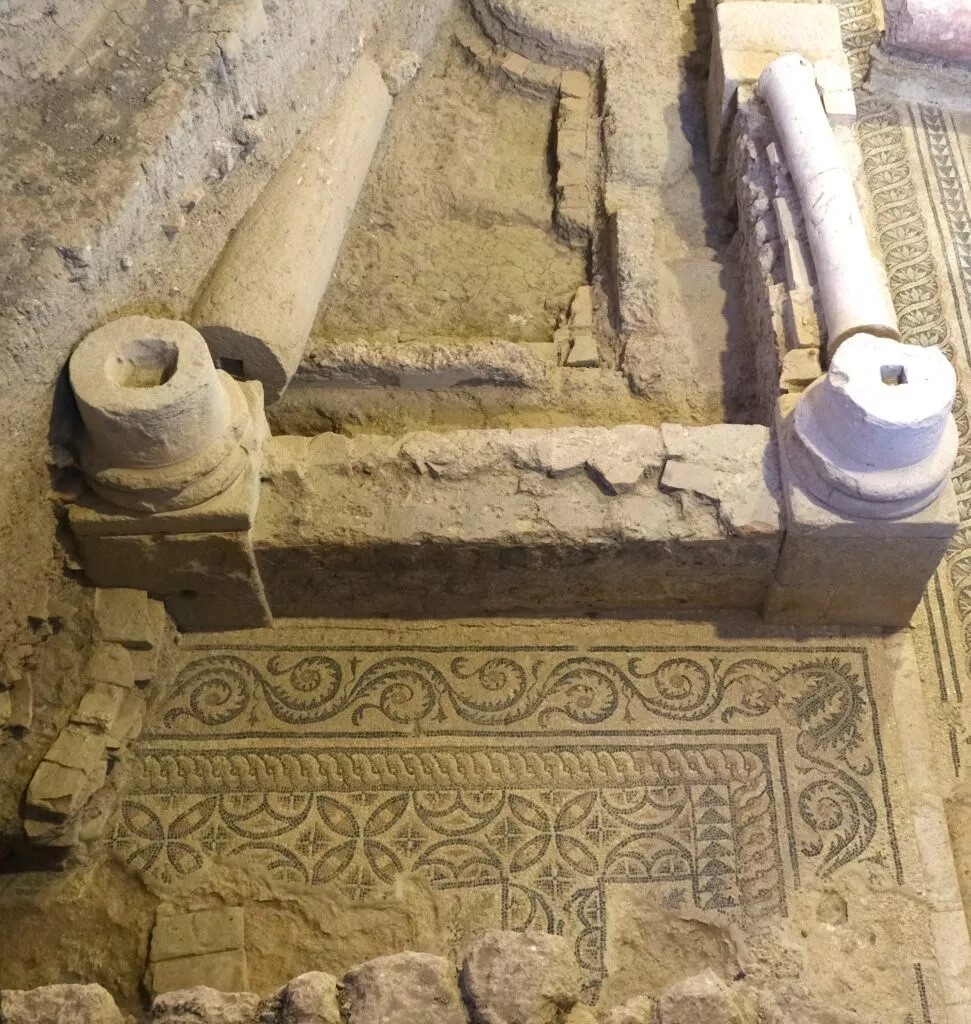
3 – Roman mosaic-making workshop
Each participant will create a personalised mosaic using ancient Roman methods.
4 – Roman natural cosmetics workshop
In this workshop, everyone will have the chance to try their hand at natural cosmetics using thyme, rosemary and products grown in the surrounding areas of the Sierra de Tejeda, Almijara and Alhama.
5 – Roman cooking workshop
Each participant will cook typical dishes from the period. A comparison will then be made with contemporary Italian cuisine.
6 – Workshop on garum, pâté and oil in Ancient Rome.
The creation of garum and the most typical pâtés of the period will be presented to visitors. There will also be a tasting session featuring products from the local olive oil factory.
Note: knowing the ingredients of Garum 🙂 , I’ll probably pass, but if the opportunity arises I’ll gladly try the rest.
Also worth seeing in Salar
The old Arab baths – El Bañuelo –
You reach it by taking a road – ruta del bañuelo – that runs alongside the river Salar . It is located one kilometre south-west of the village of Salar in a place called Fuente Alta. The water, which is hypothermic (around 20ºC) and rich in mineral salts, is much appreciated by the people of Salar, and its source is in a cave not far away.
Moorish tower and house-palace of Hernán Pérez del Pulgar
The Arab tower and this house-palace are attached. The tower dates from the Al-Andalus period, in the 13th century.
Main annual festivities in Salar
Roman Days in March
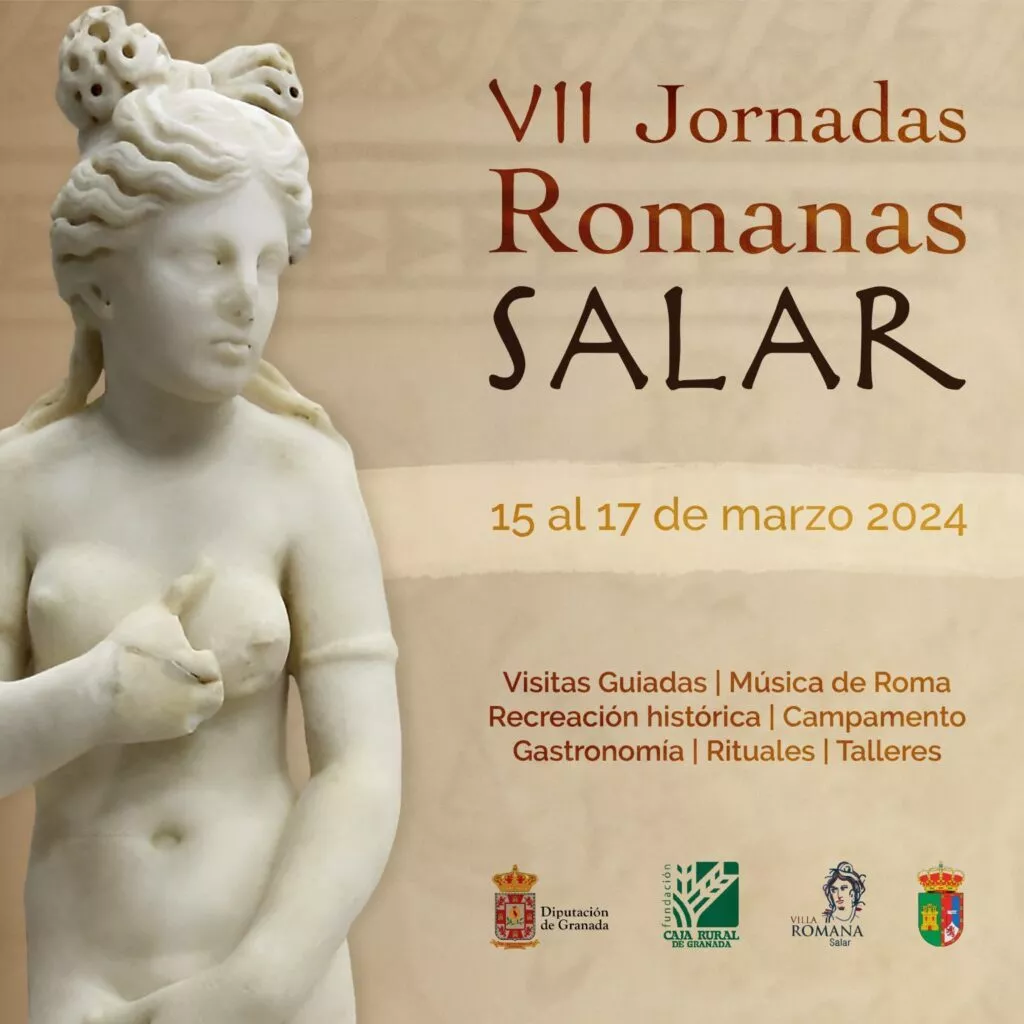
The Feria del Ganado in October
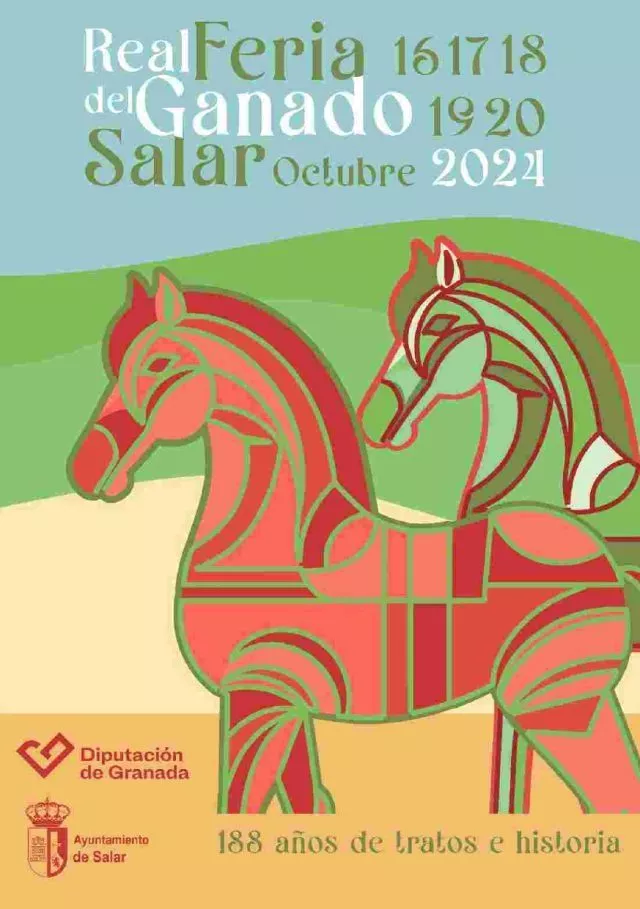
What to see and do in the vicinity of this Andalusian archaeological site
Montefrío
Montefrío is a small town in the province of Granada, not far from Salar. For your information, National Geographic magazine has listed Montefrío as one of the 10 villages with the most beautiful views in the world!
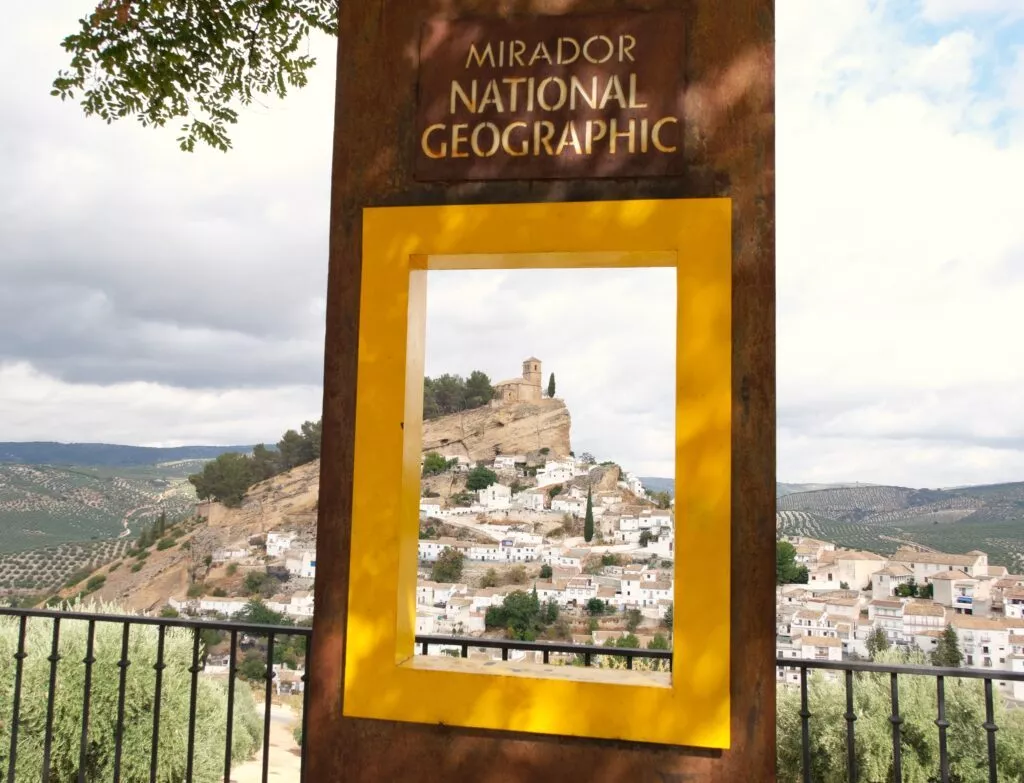
To find out more, here’s a link to what you should see in Montefrío.
Alhama de Granada
Alhama de Granada is also just a few dozen kilometres from Salar and well worth a visit. This small town is perched on the edge of a canyon.
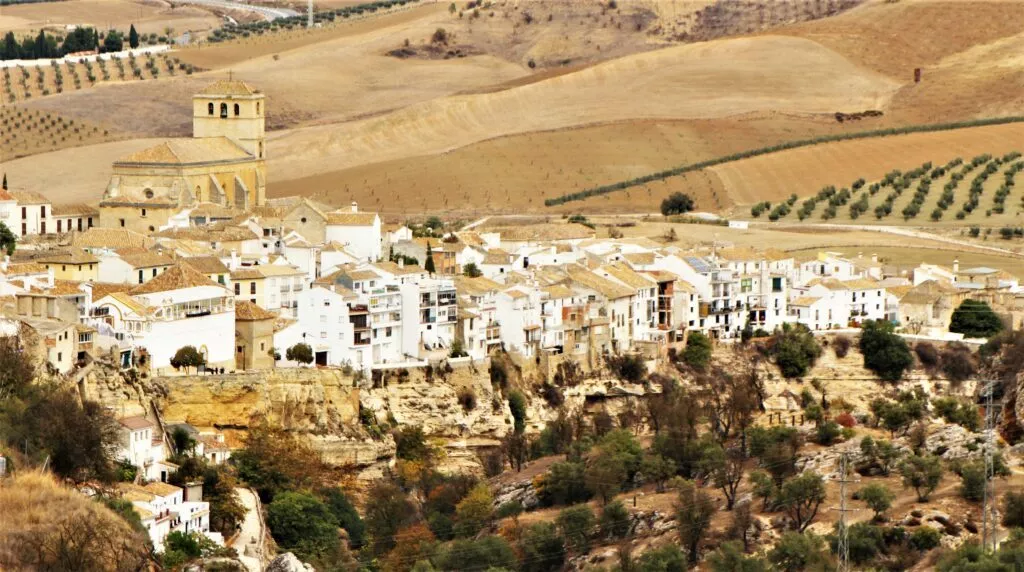
You’ll find plenty of beautiful things to do in Alhama de Granada, and the canyon alongside this small town offers breathtaking scenery.
Book an excursion or activity in the province of Granada
Below you’ll find the excursions and activities on offer from Granada.
You can also book them online today (with free cancellation):
Book accommodation in Montefrío
The town of Montefrío is relatively close by and offers a greater variety of accommodation.
CBelow you will find all the hotels and accommodation available in Montefrío, once you have selected your dates:
Some ideas and useful links
The links below can be very useful depending on where you are staying and what you need to do to have a wonderful time in Andalucia.
- An interactive map of Andalucia to find lots of ideas for visits around you, off the beaten track.
- link to book a rental car at Malaga airport.
- link to book a rental car anywhere else in Andalucia with the rentalcars platform.
- If you’re on the Costa del Sol and looking for ideas for excursions in Andalucia, you can use the following link to book a tour departing from Málaga, Torremolinos, Estepona or Benalmadena.
Discover more of Andalusia’s beautiful sites in the Andalucia blog pages.
Here is the link to receive our blog newsletter.
Here are the latest articles on Andalusia
-
Interactive map of Andalucia with best places to see
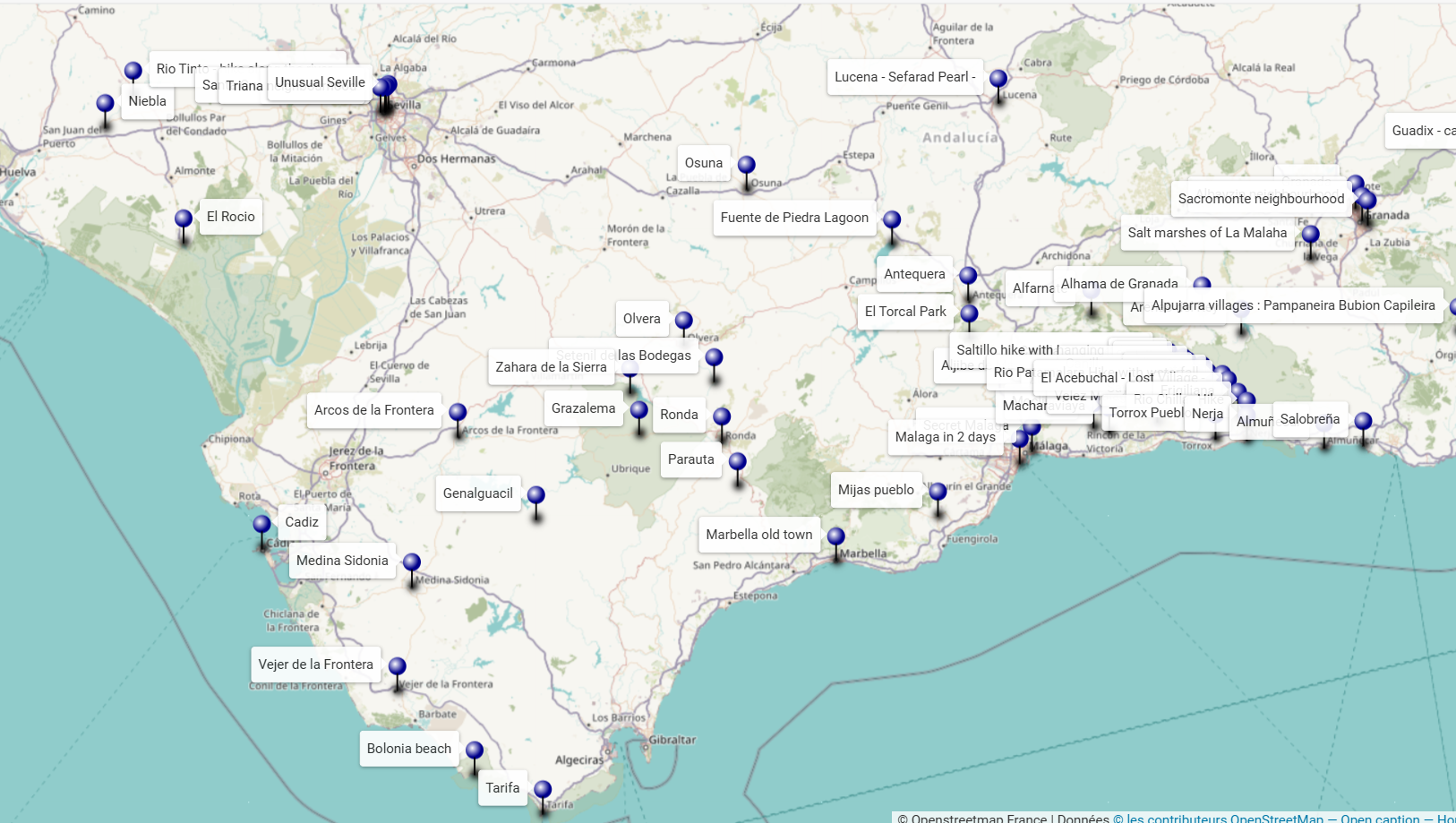
An interactive map of Andalucia to discover the sites to see around your holiday destination or to prepare a tour or road-trip.
-
What to see in Parauta and its enchanted forest ?
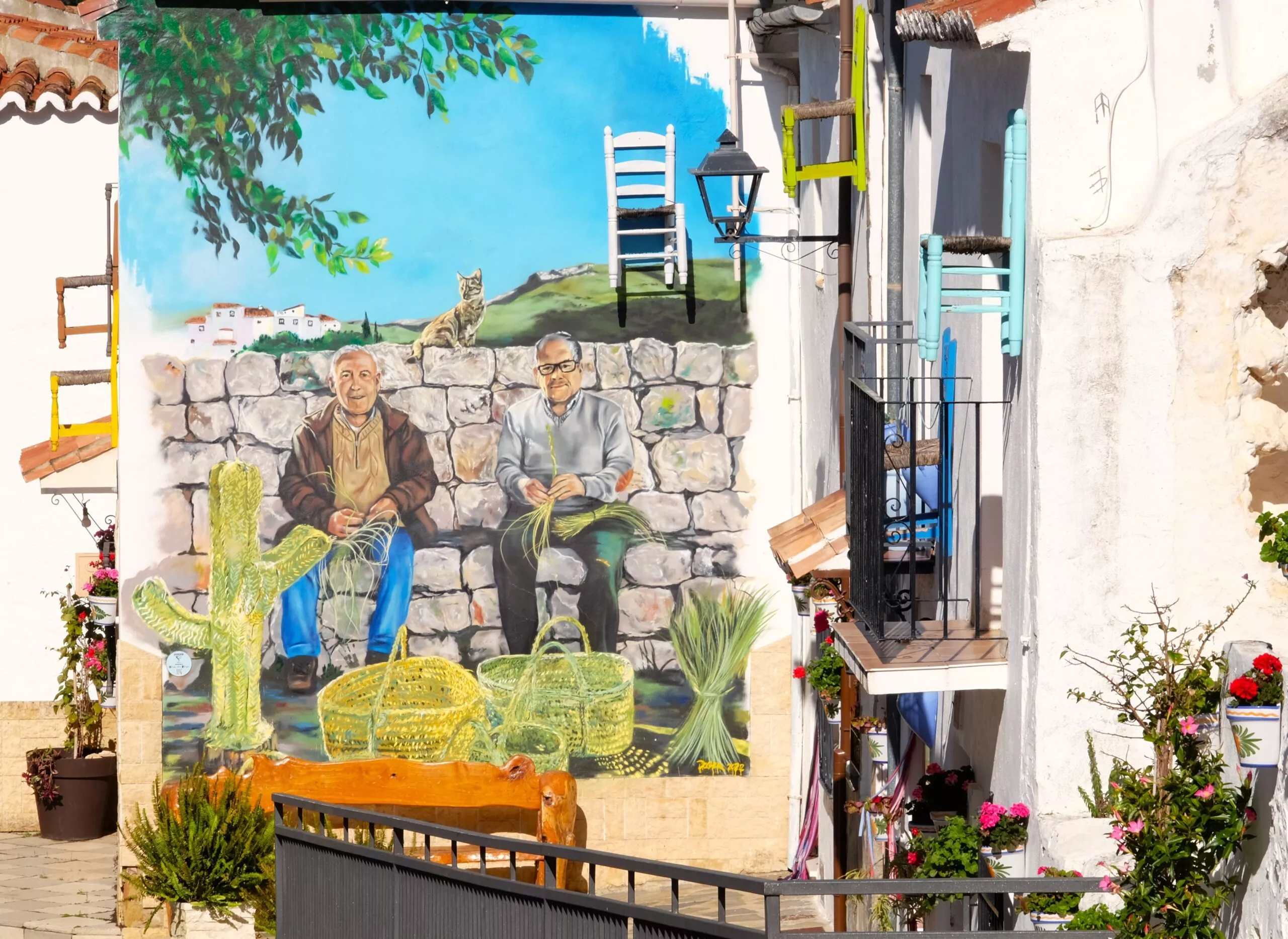
All the essential things to see in the wonderful village of Parauta and also in its very curious enchanted forest, el bosque encantado.
-
What to see in Genalguacil in the Vizier’s beautiful gardens
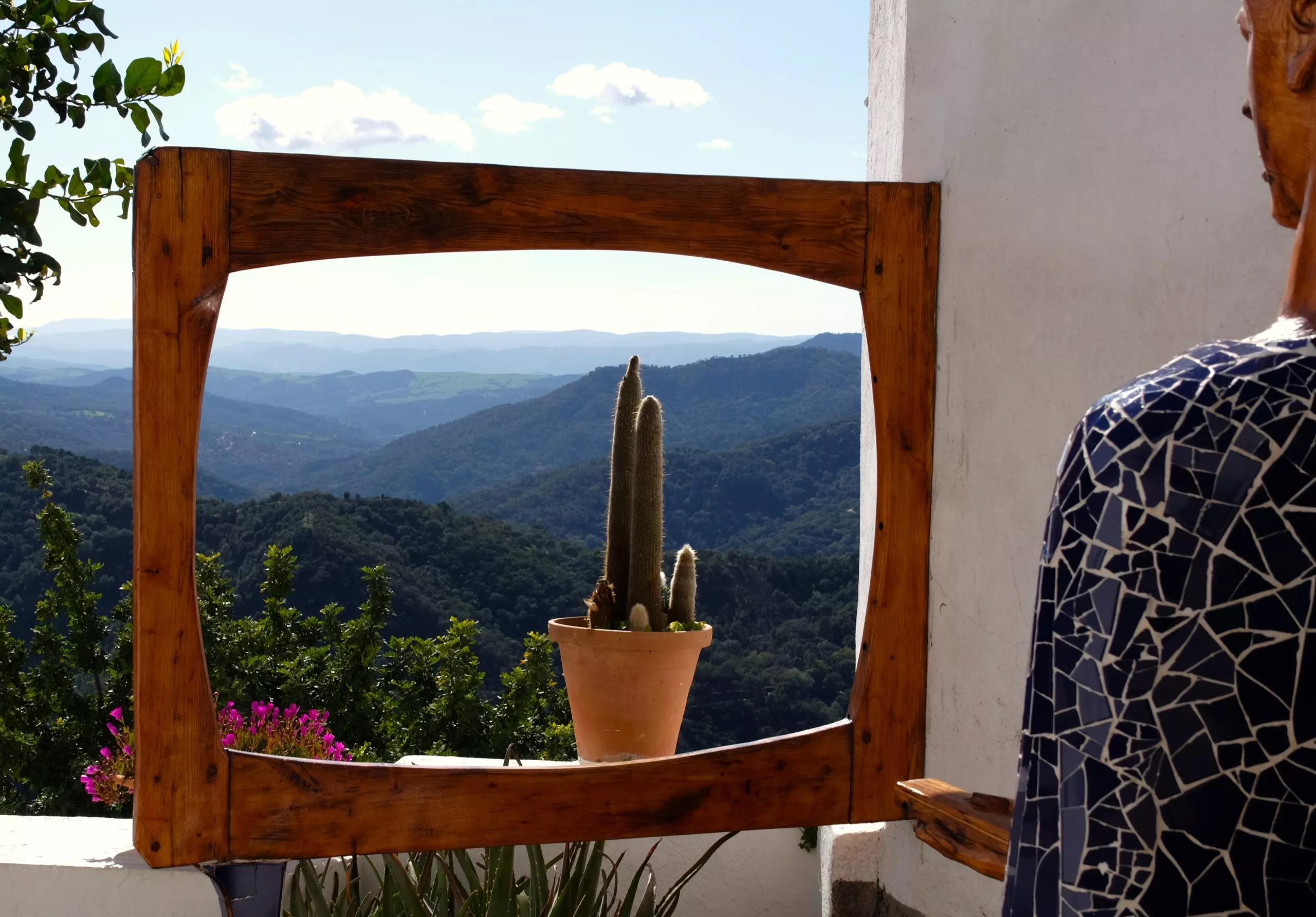
Here are all the essentials about what to see in the incredible village-museum of Genalguacil. A curious journey is waiting for you.
